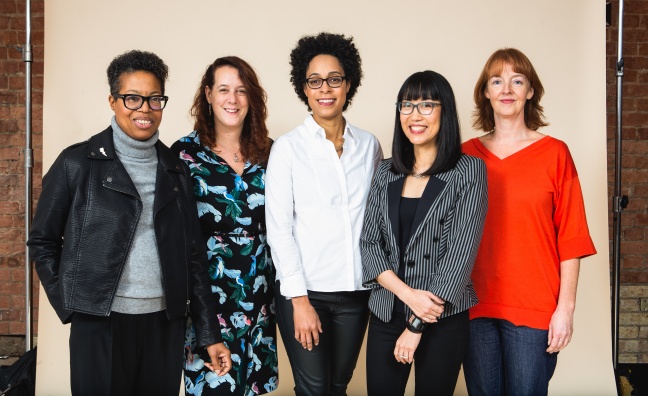As the year winds to a close, thoughts in the music business invariably turn to the future, to possible changes to come.
With that in mind, we asked the 12 executives on the Music Week Women In Music Roll Of Honour 2019 to discuss the changes they’d like to see across the industry, and to share their vision of the future.
This year’s show gathered an array of music business stars including Emily Eavis, Camille ‘Kamille’ Purcell and Radha Medar, who shared the stage with the Roll Of Honour. As ever, the sixth edition of the Awards saw many issues up for debate, including 50/50 festival bills, diversity, songwriting and more.
Here, the Roll Of Honour weigh up what the years ahead may hold…
What is your vision for the industry’s future?
Frances Moore, CEO, IFPI
“A truly global industry thriving in every part of the world. Asia now has four of the top ten markets. The recording industry in Africa is developing. We are seeing artists from Latin America becoming global hits. The companies are pushing forward and investing for the long-term so there is lots to be excited about. Our top priority is achieving a fair value for music around the world.”
Dorothy Hui, VP, digital & audience development, 4th Floor Creative – Sony Music UK
“I believe the industry’s future will rely on empathy. Because the streaming model is now dictated by audience behaviours, it becomes more important for us to understand the motivations behind why and when listeners choose our artists so that we can create more meaningful experiences. Additionally, as the media landscape becomes more complex and fast-moving, being able to empathise with colleagues and team members is increasingly critical to having a fruitful working relationship — both to ensure there is diversity in perspectives and that we all look out for each other.”
Colleen Maloney, director of communications, Domino
“I’d love to see more recognition for the fact that it’s the independents who are setting the culture, truly investing in new artists and allowing them creative freedom. We are supporting and delivering culturally significant artists who change the musical landscape for the better.”
I would love to see a balance of gender and diversity in every area
Nicola Spokes, Caroline International
Lorna Clarke, pop controller, BBC
“Watching Little Simz, FKA Twigs, Brittany Howard, Georgia and Jessie Ware perform on the recent revamped series of Later… with Jools Holland on BBC2, I’m really excited about the future for women in music.”
Polly Comber, creator/director, Black Fox Management Ltd
“It’s hard to know how things will unfold but with greater collaboration with charities, and so forth, the industry might become a more compassionate place to work in.”
Nicola Spokes, UK label head, Caroline International
“Balance – I would love to see a balance of gender and diversity in every area of the industry. Artists, their campaigns and the industry as a whole will benefit enormously when there are more balanced and diverse opinions being given, ideas being shared, strategies being formulated, at every level and in every area of the music business. It’s definitely happening but we’re not fully there yet.”
Music needs to be more accessible
Lucy Noble, Royal Albert Hall
What would you change about the music industry?
Lucy Noble, artistic & commercial director, Royal Albert Hall
“It needs to be more accessible. You should not be prevented from entering the music industry because of your cultural or financial background. We’ve committed to a wide-ranging programme that includes apprenticeships, the Young Producers initiative and our partnership with the BRIT School, alongside workshops and networking events, which is designed to help get rid of those barriers.”
Semera Khan, creative director, Polydor
“The impossible… More hours in the day please!”
Heulwen Keyte, agent, UTA
“To help create a better work-life balance, which would allow for increased productivity and improvements in mental health and well-being.”
Kate Alderton, UK finance director, Warner Chappell Music
“After qualifying as an accountant in a professional services firm, I love working in the industry - but just because something is great, doesn’t mean it can’t be better. I feel passionately about treating people equally, and treating people fairly, and I hope that the industry continues to make improvements in this area for all involved.”
I would make flexible working widespread
Gee Davy, AIM
Remi Harris MBE, creative business trainer and consultant, Remi Harris Consulting
“To somehow make it a more financially sustainable and rewarding one for more artists/songwriters.”
Gee Davy, head of legal and business affairs, AIM
“I would make flexible working widespread. Many studies have shown this to be one of the most crucial factors in helping women, parents, people with disabilities and others join and stay in work. Some workplaces, AIM included, are fostering more flexible working and there are challenges for businesses as it generally involves more trust, management, and co-ordination than standard ‘office hours’, but the benefits for both productivity and mental and physical health alone are significant. If I’m allowed a bonus answer, I think a key way to improve future diversity and gender balance in our industry would be to re-instate the full government-subsidised apprenticeship scheme to small music businesses.”
PHOTO: Jenn Five










